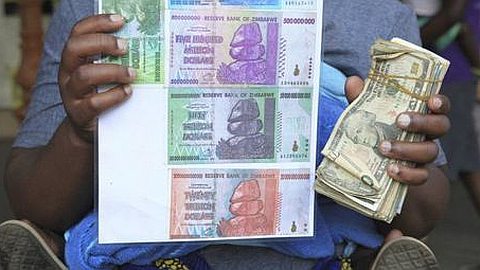Zimbabwe Should Learn from Mauritius

Zimbabwe is, however, right at the bottom and is ranked number 175 out of a total of 177 countries, beating only Cuba and North Korea. Mauritius currently has a population of 1,3 million and Zimbabwe’s population stands at 12, 9 million.
Although Zimbabwe has a larger population, its Gross Domestic Product (GDP) as at September 2012 was US$10,81 billion, similar to that of Mauritius at US$10,49 billion.
Zimbabwe Independent reporter, Hazel Ndebele (HN) was in Mauritius last week and caught up with the Managing Director of the Mauritius Board Of Investment (BOI) Ken Poonoosamy (KP) who spoke about how to promote outward investment. He also shared the Mauritian business experience as it has had a commendable economic and investment track-record for 45 years.
HN: You have been dealing with investment for more than seven years now; can you briefly share with us your experiences concerning this?
KP: Our economy has graduated to become an investment platform and gateway in Africa as more international companies are using Mauritius as a base to establish their businesses on the continent. The country has increased numbers of partnership and joint ventures with international investors. There has been sophistication in the way institutional as well as corporate investors are interested in Africa at large.
Mauritius has become a hub of investment because the country has since its independence created confidence and comfort among investors. There is new appetite in many sectors which include our largest at the moment, which is the textile sector. This is briefly what I have seen in the time I have been here.
HN: Why are investors coming to Mauritius and what are you doing to promote foreign investment?
KP: There is a legacy in Mauritius that we are a stable and democratic country where there is rule of law. The government is pro-business, so there is complete synergy between the public and private sectors to push for economic development. Basic ingredients or conditions which investors look for are here, which is why I believe they choose Mauritius. Over and above that we have the ease of doing business and we continually improve the business climate. We are in partnership with the United States, which I think makes us competitive in the markets.
We have a number of instruments which guarantee investors’ rights and comfort, part of them being the industrial protection agreement. Mauritius has invested in good infrastructure over the years and has embraced information technology. For instance, what used to be a sugar cane field 10 years ago a few kilometres outside the capital, Port Louis, is now one of our best attractions called Ebene Cyber City and investors look at such things.
HN: What have you done to improve the business climate of Mauritius?
KP: We initiated reforms back in 2005 and 2006 where we said that we should embrace globalisation and move away from trade preferences which mean that there is a complete difference in the way we engage the international community and do business.
We have said there are certain building blocks that we should create, firstly being the ease of doing business in Mauritius; we have made sure that when an investor comes here it’s easy for them to incorporate a company which takes a half a day in terms of licensing, registering companies and registering properties. It used to take 190 days to register property in the country but it only takes 15 days now. We have deployed information technology everywhere, so instead of people moving, it is data that moves.
We have come a long way to facilitate business. In terms of the taxation regime, we have made it very simple where our tax is 15% for local companies and foreign-owned companies. When we compare and benchmark with other countries, Mauritius has the lowest tax regime. There is also 100% foreign ownership of companies in the country.
HN: What is the current relationship between Mauritius and Zimbabwe when it comes to investment. How are the two countries collaborating?
KP: The two countries are collaborating well and there is interest from the Mauritian government to reinforce business cooperation. We have a number of Zimbabwean investors in Mauritius, for example we have a Zimbabwean company which majors in art designs and decorations. We want to increase our business, trade and investment with Zimbabwe and we are willing to share our experiences with your country.
HN: Mauritius has had a commendable economic and investment track-record since its independence in 1968, what in your view should Zimbabwe learn and do to attract investment?
KP: Zimbabwe is on the right track. The country has had its own problems. However, it is in transition and has potential to do well. If you look at the continent, there are significant numbers of countries which are picking up and Zimbabwe is one of them. We received a delegation from Zimbabwe recently. However, for the mean time, I cannot share details with you but the delegation expressed optimism about your country.
HN: Mauritius is understood to be keen on investing in Zimbabwe, how are the plans going? And in which areas are Mauritians interested in investing?
KP: There is a lot of interest in the services sector; Mauritians would like to invest in service- oriented activities such as teaching. The mining and sugarcane industry is interesting and we will look into it. A delegation under the auspices of Enterprise Mauritius was in your country last month in search of joint venture partnerships, particularly those in the textile and manufacturing sectors.
HN: Currently, how many Mauritian companies are registered in Zimbabwe?
KP: There are three Mauritian companies registered in Zimbabwe, namely Afrasia Bank, Beachcomber/New Mauritius Hotels Limited and Ireland Blyth Limited.
HN: Some business communities have said Zimbabwe’s indigenisation policy limit investments for the country; does the Mauritian business community understand this policy?
KP: The Mauritian business community understands the policy and is willing to work with the Zimbabwean business community. However, since Zimbabwe is re-building its economy it needs to come up with viable and clear policies to attract investors.





